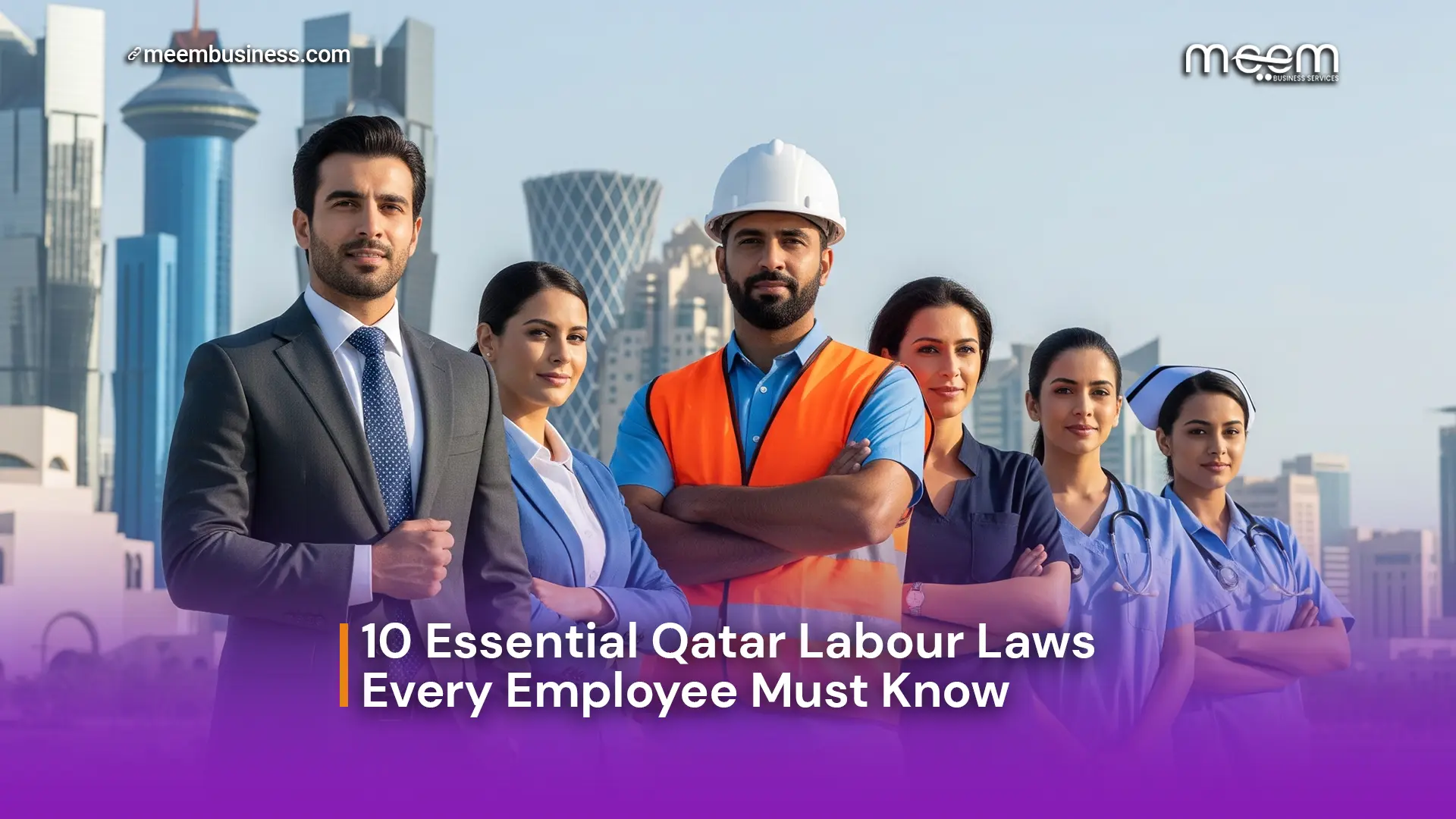Do you ever wonder if your salary, leave, or gratuity is being handled fairly? Qatar labour laws are something every worker in the country should know. Knowing the law helps you avoid confusion, prevent disputes, and feel more secure in your career.
At Meem Business Services, we’ve spent years helping employees and businesses in Qatar understand and apply labour regulations the right way. Our knowledge comes from working directly with clients, reviewing contracts, and staying updated on Law No. 14 of 2004 (as amended) and the latest reforms.
In this article, we’ll break down the ten key rights under Qatar labour laws, including contracts, probation, working hours, maternity leave, and end-of-service gratuity.
TL;DR — Quick Glance
Here’s a fast, snapshot of your key rights under Qatar labour laws—tap any row to expand.
Employment Contract Art. 38
Probation Art. 39
Notice Period Art. 49–50
Minimum Wage & WPS Decision 2021
Working Hours & Overtime Art. 73–75
Annual Leave & Holidays Art. 78–81
Sick Leave Art. 82
Maternity & Equal Pay Art. 93–98
End-of-Service (EOS) Art. 54
Settlement & Repatriation Art. 53, 57, 67

1. Written Employment Contracts
In Qatar, every job must begin with a written contract. Article 38 of the Labour Law requires that this contract is approved by the Ministry of Labour and prepared in three copies: one for the employer, one for the worker, and one kept with the Ministry.
A proper contract should clearly state:
- Employer’s name and workplace
- Employee’s name, nationality, and job title
- Job description, start date, and place of work
- Duration of the contract if it is fixed-term
- Wage, allowances, and method of payment
Even though the law allows employment to be proven in other ways, a signed and approved contract offers the strongest protection. It helps prevent disputes over salary, duties, or benefits and provides a clear reference if a conflict arises.
2. Probation Period Rules
Probation is a trial period that allows both the employer and the employee to test if the job is a good fit. Article 39 of the Labour Law sets clear limits on probation to protect workers from unfair treatment.
The main rules are:
- Length: Probation cannot be longer than 6 months.
- Frequency: It can only be applied once with the same employer.
- Employer termination: If the worker is unsuitable, the employer may end the contract during probation, but must give at least 1 month’s written notice.
- Employee transfer: If the worker wants to move to another employer, they must give 1 month’s notice. The new employer must reimburse the old one for recruitment costs, up to 2 months of the worker’s basic wage.
- Leaving Qatar: If the worker plans to leave the country, written notice of no more than 2 months is required.
- Compensation: If either side fails to give proper notice, they must pay compensation equal to the basic wage for the required period
3. Notice Period After Probation
Once probation ends, both the employer and employee must respect notice rules if they wish to end the contract. Article 49 of the Labour Law explains that the notice period depends on the worker’s length of service.
- Up to 2 years of service: Notice period is 1 month.
- More than 2 years of service: Notice period is 2 months.
- Compensation: If either side fails to give notice, they must pay compensation equal to the worker’s basic wage for the period that was not observed.
- During notice: Employees must continue working as usual and are entitled to full wages until the end of the notice period (Article 50).
This system prevents sudden job loss or staff shortages and gives both sides time to plan.
4. Minimum Wage & Wage Protection System
Qatar introduced a national minimum wage in March 2021, and it remains in force under the labour law in 2025. This rule applies to all workers, including domestic staff, and guarantees a baseline level of income.
The minimum wage package is:
- Basic wage: QAR 1,000
- Housing allowance: QAR 500 (or housing provided in kind)
- Food allowance: QAR 300 (or food provided in kind)
Articles 66 and 67 of the Labour Law also require wages to be paid in Qatari Riyals and transferred through the Wage Protection System (WPS) into a local bank account. Salaries for monthly contracts must be paid at least once a month, while wages for other workers must be paid at least every two weeks.
If a contract ends, the employer must settle all dues by the next day. If a worker leaves without notice, settlement must be made within seven days.
5. Working Hours, Overtime & Rest Days
The Labour Law sets clear rules on working hours to protect employee health and maintain balance. Article 73 states that normal working hours must not exceed 48 hours per week (8 per day). During Ramadan, the limit is reduced to 36 hours per week (6 per day).
Additional rules include:
- Breaks: Workers cannot work more than 5 continuous hours without a break. Breaks should total between 1–3 hours for rest, prayer, or meals.
- Overtime pay: Extra hours are paid at the basic wage plus at least 25%.
- Night work: Work done between 9 pm and 3 am must be paid at the basic wage plus at least 50%, except for shift workers.
- Daily maximum: Total hours, including overtime, cannot exceed 10 per day except in emergencies.
- Weekly rest day: Friday is the paid rest day. If an employee works on Friday, they must get another rest day or receive their basic wage plus 150%.
📌 Tip: Always review your payslip if you work overtime or on rest days to confirm that compensation matches the law.
6. Annual Leave & Public Holidays
Time off is a key right under Qatar’s Labour Law, ensuring workers can rest and recharge. Articles 78–81 outline both official holidays and annual leave entitlements.
Public holidays with pay include:
- 3 working days for Eid al-Fitr
- 3 working days for Eid al-Adha
- 1 working day for Independence Day
- 3 additional working days chosen by the employer
Annual leave entitlements:
- Employees with less than 5 years of service: 3 weeks per year
- Employees with 5 or more years of service: 4 weeks per year
Employers decide when leave can be taken, but they can only split annual leave into two parts with the employee’s consent. Workers may also carry over up to half of their leave to the following year. If the contract ends before leave is taken, payment for unused leave must be provided.
7. Sick Leave Entitlements
Health issues can affect anyone, and the Labour Law provides clear protections for workers who fall ill. Article 82 sets out how sick leave is managed once an employee has completed at least three months of service and presents a valid medical certificate.
Entitlement schedule:
- First 2 weeks: Full pay
- Next 4 weeks: Half pay
- Following 6 weeks: Unpaid leave
If the illness continues beyond 12 weeks and a doctor confirms the worker cannot return to their job, the employer has the right to terminate the contract. However, this does not affect the worker’s entitlement to end-of-service gratuity.
Special cases: If a worker resigns for health reasons with medical approval, they are still entitled to the balance of their sick leave pay. If a worker dies during this period, their family is entitled to any unpaid balance.
8. Women’s Rights: Maternity, Equal Pay & Protection
The Labour Law provides clear safeguards for women to ensure fair treatment at work and support for family responsibilities. Articles 93–98 outline these rights.
Equal Pay (Article 93):
Women must receive the same wage as men for the same work. Employers must also provide equal access to training and promotions.
Maternity Leave (Article 96):
- Women with at least one year of service are entitled to 50 days of paid maternity leave.
- At least 35 days must be taken after delivery.
- If the remaining balance is less than 30 days, the worker may use annual leave or unpaid leave.
- If medical complications prevent return to work, the law allows up to 60 additional days of unpaid leave with a doctor’s certificate.
Lactation Break (Article 97):
For one year after returning from maternity leave, mothers are entitled to 1 hour per day for breastfeeding. This counts as paid working time.
Job Security (Article 98):
Employers cannot terminate a woman’s contract due to marriage, pregnancy, or maternity leave. They also cannot issue a termination notice that ends during maternity leave.
📌 Why it matters: These protections encourage women to continue working while balancing family life. At Meem Business Services, we help employers design policies that support compliance and workplace equality.
9. End-of-Service Gratuity
End-of-service (EOS) gratuity is one of the most valuable rights for employees in Qatar. Article 54 of the Labour Law states that any worker who has completed at least one year of service with the same employer is entitled to this benefit.
The main rules are:
- The gratuity must be not less than three weeks’ basic wage for every completed year of service.
- Fractions of a year are calculated on a pro-rata basis.
- The calculation is always based on the worker’s last basic wage, excluding allowances or bonuses.
- Continuous service includes periods of leave, permitted absence, or work interruptions not caused by the employee.
You can calculate you gratuity with our gratuity calculator Qatar for free.
Employers may deduct any outstanding debts from the gratuity amount. Workers covered by a pension or retirement system may receive benefits from that scheme instead, provided it offers more than the standard gratuity.
10. Final Settlement, Certificates & Repatriation
When employment ends, the Labour Law ensures that workers receive their dues quickly and can return home if needed. Articles 53, 57, and 67 outline these rights.
Final settlement:
- Employers must pay all outstanding wages and dues by the end of the next day after the contract ends.
- If the worker leaves without giving notice, the employer has up to 7 days to make payment.
Service certificate (Article 53):
Upon request, the employer must provide a free service certificate showing the worker’s job title, joining and leaving dates, main duties, and last wage. This is often required when applying for a new job.
Repatriation (Article 57):
- Non-Qatari employees are entitled to a return ticket to their place of recruitment (or another agreed destination).
- The employer must arrange this within two weeks of termination.
- If the worker transfers to a new job, the new employer becomes responsible.
- In the event of death, the employer is responsible for repatriating the body.
Recent Labour Reforms in Qatar
Qatar has introduced several important labour reforms in recent years, making the system more transparent and worker-friendly. These changes remain part of Qatar labour law 2025 and continue to shape how employees and employers interact.
Key reforms include:
- Removal of the No Objection Certificate (NOC): Since 2020, workers no longer need an NOC to change jobs. They can move freely to another employer by giving proper notice, which increases mobility and bargaining power.
- Minimum wage reform: Qatar was the first country in the region to introduce a non-discriminatory minimum wage, which still applies to all workers in 2025.
- Unified complaint platform: The Ministry of Labour launched a digital system where workers can file complaints, track progress, and ensure fair handling of disputes.
- Heat stress rules: Outdoor work is banned during the hottest hours of summer (10 am to 3:30 pm, June to mid-September). Employers must also provide shaded rest areas, water, and protective measures.
These reforms have improved working conditions, boosted Qatar’s global reputation, and given employees more rights and flexibility. Meem Business Services helps both workers and employers adapt to these changes and stay compliant.
FAQs
Conclusion
Understanding your rights under Qatar labour laws is essential for building a secure and fair career.
At Meem Business Services, we help both employees and employers navigate these rules with confidence. Whether you need help reviewing a contract, calculating end-of-service benefits, or ensuring compliance with Ministry requirements, our team is ready to guide you every step of the way.
Contact us today to make sure your workplace rights and responsibilities are always protected.
WRITTEN BY

Unais Naranath
Manager at Meem Business Services
Unais is a specialist in government relations with a background shaped by key roles in Qatar’s medical and public sectors. His experience includes 2 years with Naseem Al Rabeeh Medical Center (MOPH), and 1 year as a Qatar Public Relations Officer.
Connect on LinkedIn →





